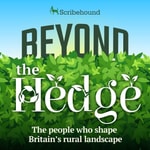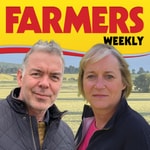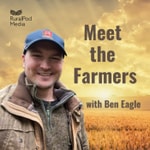Voices of the Countryside – Détails, épisodes et analyse
Détails du podcast
Informations techniques et générales issues du flux RSS du podcast.

Voices of the Countryside
Scribehound
Fréquence : 1 épisode/4j. Total Éps: 52

Classements récents
Dernières positions dans les classements Apple Podcasts et Spotify.
Apple Podcasts
🇬🇧 Grande Bretagne - wilderness
13/08/2025#74🇬🇧 Grande Bretagne - wilderness
12/08/2025#48🇬🇧 Grande Bretagne - wilderness
11/08/2025#32🇬🇧 Grande Bretagne - wilderness
08/08/2025#92🇬🇧 Grande Bretagne - wilderness
07/08/2025#71🇬🇧 Grande Bretagne - wilderness
06/08/2025#61🇬🇧 Grande Bretagne - wilderness
05/08/2025#50🇬🇧 Grande Bretagne - wilderness
04/08/2025#32🇬🇧 Grande Bretagne - wilderness
01/08/2025#90🇬🇧 Grande Bretagne - wilderness
31/07/2025#81
Spotify
Aucun classement récent disponible
Liens partagés entre épisodes et podcasts
Liens présents dans les descriptions d'épisodes et autres podcasts les utilisant également.
See all- https://join.scribehound.com/
6 partages
- https://www.scribehound.com/subscription
3 partages
- https://www.instagram.com/floffal
2 partages
Qualité et score du flux RSS
Évaluation technique de la qualité et de la structure du flux RSS.
See allScore global : 52%
Historique des publications
Répartition mensuelle des publications d'épisodes au fil des années.
Charlie Jacoby: Might Hunters and Hawkers be a Protected Group Under the Equality Act? [6 min Listen]
Épisode 52
mercredi 28 août 2024 • Durée 06:04
You may have seen the story: the 2010 Equality Act could protect people who hunt. Here’s how it could play.
An interview at the Carter Jonas Game Fair Theatre has led to column inches and TV debates. Ed Swales of Hunting Kind, a group dedicated to ‘natural hunting’ with hound, ferret and hawk, obtained legal opinion which says that people who hunt could have “protected characteristics” under the 2010 Equality Act and that they must establish cases of discrimination against them. He announced his findings at the Game Fair.
Thanks to the publicity, the UK’s media has enthusiastically taken up the idea of protecting people who hunt or shoot in the same way that the law protects Roma or LGBTQ communities. There was an article in the Daily Telegraph, then the Guardian, then the Daily Mail, and hot on their heels came the TV interviews, on Good Morning Britain and even I got the call-up from GBNews.
There are few solid arguments against it, except for the emotional. Ed had one interviewer pointing out that Ed chooses to hunt, that he could choose not to hunt. The answer to that is that we choose to do everything – shop in supermarkets, go on country walks – that's culture. The culture Ed is defending is a different culture to the interviewer's and Ed is trying to protect it.
Charlie Flindt - Tigger the Terracan: From Farm Workhorse to Retirement Riddle [11 min listen]
Épisode 51
mardi 27 août 2024 • Durée 10:59
My faithful farm truck sits in the yard, not exactly sure how it is supposed to spend its days - or justify its hefty running costs. What's the future for such a loyal beast?
Join me, if you will, in some automotive anthropomorphism, and spare a thought for Tigger the Terracan, who sits in the farmyard, having a bit of an existential crisis.
Tigger, you see, is my farm 4x4, and, since our semi-retirement, it hasn’t had much in the way of work. When we were full-on farming, it was out and about most days: hauling, carrying, towing and giving lifts and shuttling me back and forth from my tractor and combine. And in all those tasks, it was pretty well unbeatable. But now its days are quieter. Almost too quiet.
Let’s go back a couple of decades, though, to when Hyundai was a bit of an unknown quantity in the British motoring world. In 2003, I was invited (as an F-list motoring journalist) to the launch of the Terracan in the North Yorkshire Moors. And as my test car made its way along a deep riverbed (not sure you’d be allowed to do that now) I was impressed. Here, I thought is an old school 4x4 of immense capability.Owen Williams: Give power back to farmers - the solution to Britain's nature and climate crises [16 min listen]
Épisode 42
lundi 19 août 2024 • Durée 15:30
With demands on the public purse being extremely high, should politicians be doing more to fund and facilitate bottom-up land management solutions such as Farmer Clusters which are proven to deliver more bang for the conservation buck?
My solitary four-hour drive home from Oxford to Aberystwyth marked the end of a week engaged in conversation about future land management in the UK. This started at the Royal Welsh Show and ended at the Game Fair at Blenheim Palace. In a reflective mood, I recalled a time, not long ago, when both these major countryside shows were untroubled by today’s undercurrent of anxiety about imposed policy change which is bound to have a profound impact on the livelihoods, culture, and heritage within our rural communities. As I left the dual carriageway at Abergavenny heading for the narrower winding roads of Mid Wales, it struck me that our rural communities are also facing some hard miles ahead.
The most striking element of both shows was the impressive practitioner knowledge and expertise held by the farmers, keepers, and land managers within our rural communities. Sadly, this valuable resource, built on an intimate understanding of the land they manage, is frequently overlooked in a world of top-down policy making. Whilst it can be argued that Brexit brought considerable economic risks to UK agricultural, few would disagree that it also offered us a chance to reset funding models specifically tailored to farming in the UK, rather than the “one size fits all” excessively bureaucratic approach of the EU’s Common Agricultural Policy.
Farming in the UK is unusually diverse due to our varied geography. With delivery of rural policy being ceded to the devolved governments of Wales, Scotland, and Northern Ireland, the opportunity exists for further refining of agri-funding models on a regional basis to accommodate these differences. This is a good thing, but are there even better ways of getting more bang for the conservation buck?
Pete McLeod: Ghillies vs Fishing Guides - Deciphering Roles [9 min listen]
Épisode 41
dimanche 18 août 2024 • Durée 08:57
As a fishing agent, I'm often asked what the difference is between a ghillie and a fishing guide. While the two roles are similar, there are important differences.
When out fishing it is often common to have a ghillie or a guide available to aid you in your adventure. The differences between the terms “ghillie” and a “guide” can sometimes cause confusion, and even become a bone of contention. It is a question I get asked a lot, so at the risk of putting my head above the parapet I am going to attempt to define each role as I believe they are very different. The terms "fishing ghillie" and "fishing guide" are often used interchangeably, but they denote different roles depending on the geographical and cultural context.
Ian Coghill: Rewilding - a Great Tool but a Dangerous Religion [20 min listen]
Épisode 40
samedi 17 août 2024 • Durée 20:22
Rewilding is swiftly becoming a religion - a belief system with little evidence to support its claims - but is this a sane way to manage our landscapes?
Re-wilding is a very clever idea. It is very difficult to be against re-wilding. It would be a bit like being against nostalgia. It has a vague warmth about it. It has no downside because whatever happens, it will be what nature intended.
It has another trick. It is whatever you want it to be. Anything from the local council stopping cutting the kerbside grass, through bison in pens, to planting vast forests on land that has been naturally treeless for millennia can be called re-wilding. There is a definition, but it is rambling, vague and that dreadful thing, 'a journey', and no one is really interested enough to check, so it's Liberty Hall.
In old-fashioned conservation, you try to conserve a habitat, a species, an ecosystem, or a natural or cultural landscape. To do this you did things. It required continuous, regular or occasional action, and that needed management and the continuing commitment of resources. It also had the further handicap that because you had an objective your success in attaining that objective could be assessed and sometimes people might see that you had failed.
Happily with re-wilding all that failure nonsense is completely avoided. If the curlew go because the heather is waist deep, the redshank chicks are all predated, or the peat is dried out by invading birch and leaks CO2 like a tap, it is not your fault. You bear no responsibility. It is what nature intended.
Mark Firth: The Rural Roots of Olympic Glory With a Side of Old-Fashioned Manners [3 min listen]
Épisode 39
vendredi 16 août 2024 • Durée 03:32
How Olympic history should never forget it's rural roots, integrity, or the source of so many of our medallists
24 years ago, I experienced a wonderful example of good manners - and all about a sporting event taking place the other side of the world.
As Chairman of the Campaign for Shooting, I had been approached by Ian Coley, the Alex Ferguson of the British Olympic Clay Team, for sponsorship to rent the team an Australian base where they could quietly prepare for the Sydney Olympics, without any outside brouhaha.
The young star of the team was Richard Faulds, who, to our great delight, went on to clinch gold. I had been watching on TV, very pleased at our investment of a few (very few) thousand pounds. Before Desmond Lynam (or whoever - that was probably a wee bit early in the morning for Des’s carefully manicured coiffure) announced the medal ceremony, my mobile rang. Bloody hell, I thought, I hope they’re not going to take long else I’ll miss the national anthem. Turns out it was Richard ringing to thank me. Wow! Now that sort of thoughtfulness was extraordinary then and maybe even rarer now. I do hope not.
Anyhow, moving forward 24 years to another Brit, Nathan Hales, winning Trap gold and I am tempted to reflect on the connections between the British countryside (and, frankly country sports of all sorts) and Olympic success.
Francis Fulford: Revolutionising House Building - Timber Frame vs Traditional Methods [7 min listen]
Épisode 38
jeudi 15 août 2024 • Durée 07:05
It is time that the building industry embraced change. Good for the planet and good for their profits. And good for government building targets.
Currently we are building about 150,000 houses a year. The new Government plan to raise that to 300,000 houses a year to help house the 3 million odd immigrants let into the country over the last few years by the previous government. Not to mention of course all the future ones they are planning to let in.
Incidentally that equates, at an average housing density of ten an acre, to 30,000 acres of mostly agricultural land going under tarmac and concrete every year. So, if Labour did meet its house building targets some 150,000 acres of land will be built on over the next five years. An area slightly larger than the New Forest National Park which is 140,000 acres.
It is though easy to ‘talk the talk’ but can the government ‘walk the walk.’
Giles Catchpole: Decoying Pigeons Sucks - Here's Why [9 min listen]
Épisode 37
mercredi 14 août 2024 • Durée 09:18
Wood pigeons are rightly regarded as a top-tier sporting bird, but what with wasps, nettles, the need for truckloads of clobber and the quarry's uncooperative nature, decoying them can be a pain in the proverbial
Anybody will tell you that there is no better sport to be had than decoying pigeons. In fact, everybody will tell you that there is no better sport to be had than decoying pigeons. I've said it myself. And I'll stand by it: there is no better sport to be had than decoying pigeons.
If you leave aside shooting driven grouse, obviously. Your grouse – going downwind at a zillion miles an hour - across acres of glorious purple heather is a thing of rare excitement, right enough, but it also costs a zillion ducats a day to ambush it from a butt, so when we are declaiming about the best sport to be had, we tend – out of a perfectly reasonable urge to recognise that not everyone may be able to shoot driven grouse for several weeks each season – to temper our excitement and point instead towards shooting pigeons over decoys.
Roger Morgan-Grenville - Five Minutes in Heaven: Swifts Return to my Garden
Épisode 36
lundi 12 août 2024 • Durée 09:16
I got bored of waiting and got lucky with hope and practical activism
Don’t laugh, but I once nearly went into mainstream politics.
Never mind when and for whom, but let me reassure you that the dream was a short one. I came to the early conclusion that there was a limited amount that a thin-skinned Etonian of no settled world view and the attention span of a mayfly had to offer people fighting real battles in their everyday lives, let alone deal with volcanically unpredictable leaders elsewhere in the world.
Besides, there was always that comment in one of my earliest army reports in the back of my mind: ‘I fear that this man will go through life pushing doors marked ‘pull’. Precisely. As I said, don’t laugh.
I lost interest in politics and instead rediscovered the natural world. I spent the next two decades coming to understand that other than climate change, most of the environmental challenges that beset us are much easier, quicker, cheaper and less controversial to fix than we imagine.
When I walked through Britain in the spring of 2022, I saw evidence of this over and over again- re-wetted peat on Kinder Scout, a re-meandered tributary of the Tweed above Peebles, a regenerating ‘ancient’ forest in Glen Affric- and I have been seeing it ever since.
Over the last year and a half, I have walked another 2000 miles or so round the coast, and seen it again in the offshore no-take zones, the eagles on Mull, the transformation of Holkham in Norfolk and many other things besides. Nature is resilient. So long as you haven’t killed it off, as we did with the Great Auk, you can probably bring it back.
Sam Carlisle - From First Fish to Global Conflict: What's Really Changed in 30 Years of Salmon Conservation??
Épisode 35
dimanche 11 août 2024 • Durée 07:19
Finding a copy of Trout & Salmon from 1994 shows that we’re still talking about the same environmental, and geopolitical, issues three decades on.
A wormy start“Look what I’ve found Papa!” I held up an oozing earthworm, my hands blackened by Hebridrean peat. The year was 1994, I was five years old, and we were on a family holiday to the Isle of Lewis. My enthusiasm for a day spent trout fishing was waning. We’d seen and caught nothing and I couldn’t really get this casting lark. My father took the worm from me, squished it onto the hook of our Teal, Blue & Silver fly, glanced around to make sure his friend and host hadn’t seen him, and said, “try this.”
I lobbed it into the black waters of the burn. The next moment a trout was writhing on the other end, and with all the awkwardness of a child who’d never done this before, I lifted the poor thing onto the bank. It probably weighed a quarter of a pound. Thirty years on I can still recall my uncontainable excitement. My first fish, and the moment that ignited a lifelong interest in angling.




